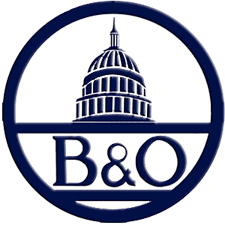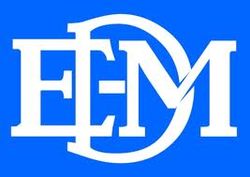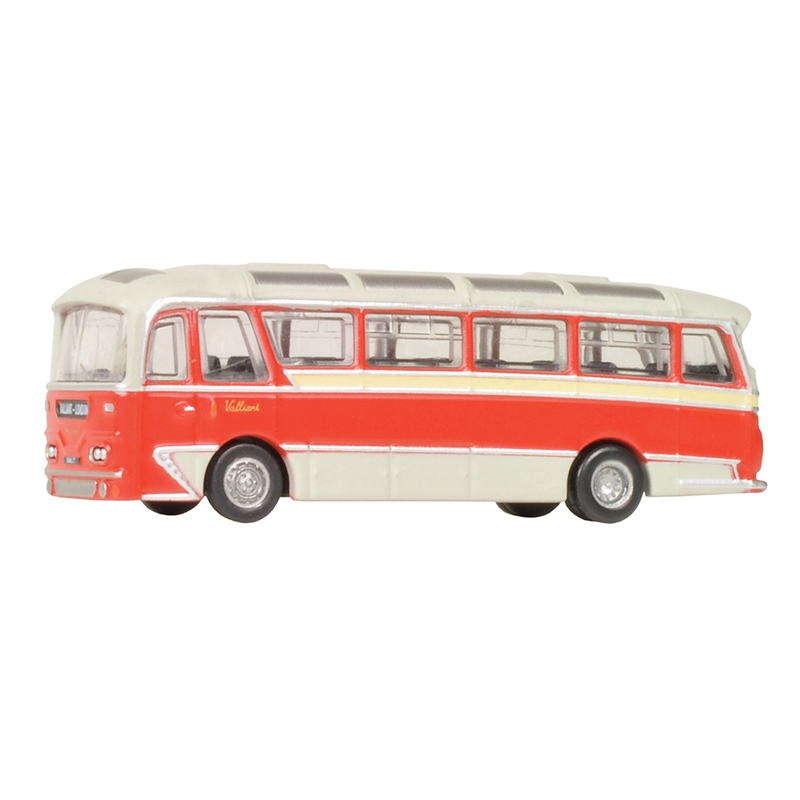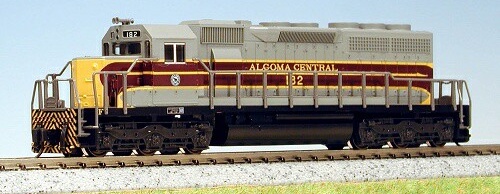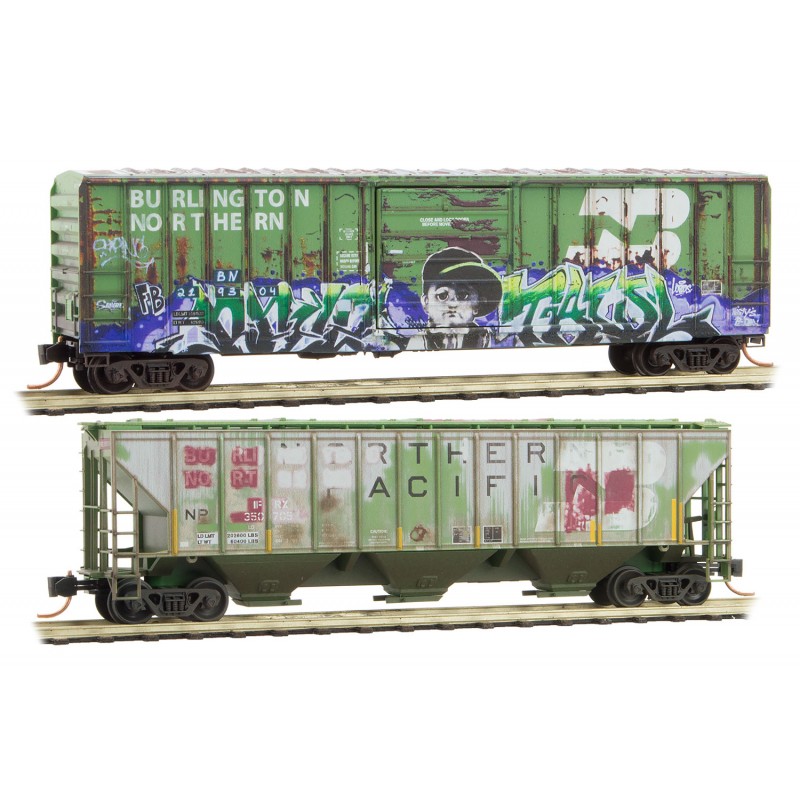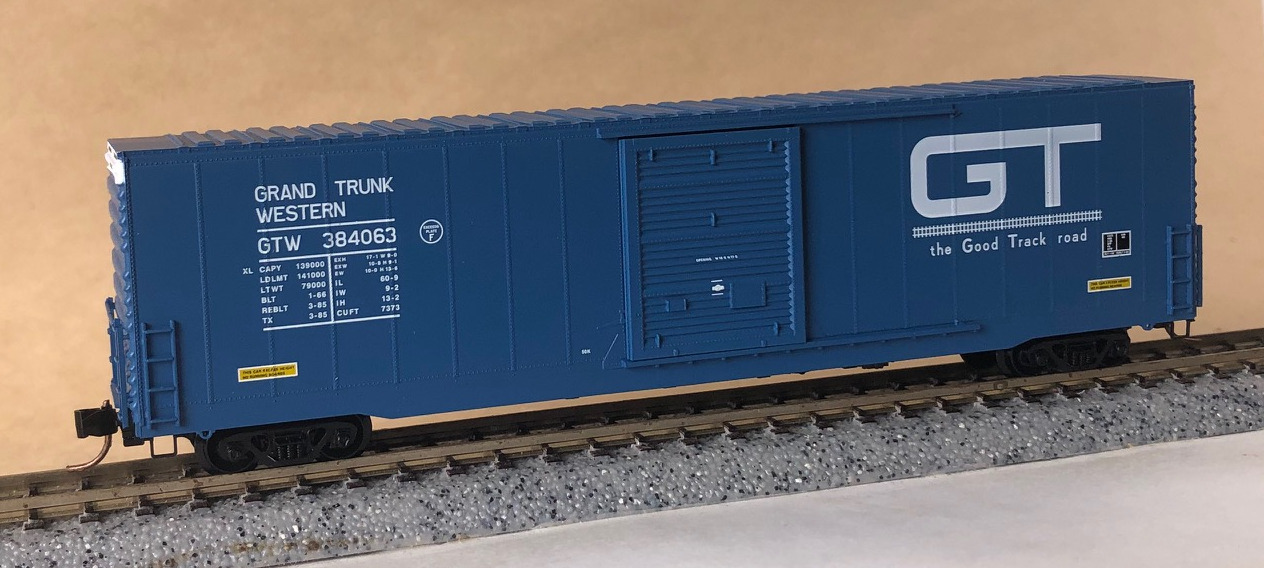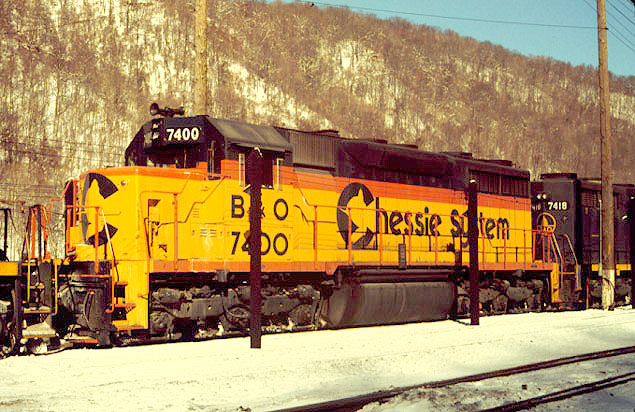Specific Item Information: Equipped with ESU’s Exclusive “Full Throttle” Sound
Model Information: This Atlas model was introduced in the 1999 Atlas catalog, although it was not available for purchase until early 2000. It was produced in China from the get-go and delivered a fairly modern mechanism for its time. It is a split-frame chassis with a single light board using a 5-pole skew-wound motor with two flywheels. In 2005, Atlas revised the model slightly by using its new slow-speed motor and golden-white LED's on the light board. It is a high quality mechanism with excellent running performance. Personally I prefer the faster motors, but I like to run my locomotives fast.
DCC Information: Both versions of this model are fully DCC-Ready. In 2018, the chassis was modified and the model now uses the DN166I3 decoder.
Prototype History: The EMD SD35 was one of the builder's first second-generation models, released during the mid-1960s. While the locomotive was not as successful as some of its other designs it did sell a few hundred examples during an era when railroads were only starting to realize the benefits of six-axle power. New features of the SD35, which dated back to the SD28 of 1965 was a redesigned frame and new Spartan Cab, commonly known as the standard cab. While EMD was experiencing growing competition from General Electric it was still in its prime and would make another run of phenomenal success during this time with models like the GP35, GP38 series, SD40 series, and others. About a dozen major railroads purchased the SD35 and a number of these remain in service. One example is known to be formally preserved, Baltimore & Ohio #7402 at the Baltimore & Ohio Railroad Museum, as well as the variant SDP35, Seaboard Air Line #1114 in Hamlet, North Carolina.
Between 1964 and 1966, EMD built a total of 360 six-axle 2,500hp SD35 locomotives. An additional 35 steam generator-equipped SDP35 locomotives were also built during this period. These were all part of EMD’s “35-Series” which also featured the four-axle, 2,250hp GP35 locomotive. All locomotives included the standard EMD 567-series prime mover. A stock model weighed 360,000 pounds, but many roads chose to add weight to increase the locomotive’s tractive effort. From the mid-1960s through the 1980s, the SD-35 could be found in road service on both large and mid-sized roads across the US. Today the number of active units has dwindled to a select few, including those operated by regional railroad Montana Rail Link. From American-Rails and Atlas.
Between 1964 and 1966, EMD built a total of 360 six-axle 2,500hp SD35 locomotives. An additional 35 steam generator-equipped SDP35 locomotives were also built during this period. These were all part of EMD’s “35-Series” which also featured the four-axle, 2,250hp GP35 locomotive. All locomotives included the standard EMD 567-series prime mover. A stock model weighed 360,000 pounds, but many roads chose to add weight to increase the locomotive’s tractive effort. From the mid-1960s through the 1980s, the SD-35 could be found in road service on both large and mid-sized roads across the US. Today the number of active units has dwindled to a select few, including those operated by regional railroad Montana Rail Link. From American-Rails and Atlas.
Road Name History: The Baltimore and Ohio Railroad (reporting marks B&O, BO) is one of the oldest railroads in the United States and the first common carrier railroad. It came into being mostly because the city of Baltimore wanted to compete with the newly constructed Erie Canal (which served New York City) and another canal being proposed by Pennsylvania, which would have connected Philadelphia and Pittsburgh. At first this railroad was located entirely in the state of Maryland with an original line from the port of Baltimore west to Sandy Hook. At this point to continue westward, it had to cross into Virginia (now West Virginia) over the Potomac River, adjacent to the confluence of the Potomac and Shenandoah rivers. From there it passed through Virginia from Harpers Ferry to a point just west of the junction of Patterson Creek and the North Branch Potomac River where it crossed back into Maryland to reach Cumberland. From there it was extended to the Ohio River at Wheeling and a few years later also to Parkersburg, West Virginia.
It is now part of the CSX Transportation (CSX) network, and includes the oldest operational railroad bridge in the USA. The B&O also included the Leiper Railroad, the first permanent horse-drawn railroad in the U.S. In later years, B&O advertising carried the motto: "Linking 13 Great States with the Nation." Part of the B&O Railroad's immortality has come from being one of the four featured railroads on the U.S. version of the board game Monopoly, but it is the only railroad on the board which did not serve Atlantic City, New Jersey, directly.
When CSX established the B&O Railroad Museum as a separate entity from the corporation, some of the former B&O Mount Clare Shops in Baltimore, including the Mt. Clare roundhouse, were donated to the museum while the rest of the property was sold. The B&O Warehouse at the Camden Yards rail junction in Baltimore now dominates the view over the right-field wall at the Baltimore Orioles' current home, Oriole Park at Camden Yards.
At the end of 1970 B&O operated 5552 miles of road and 10449 miles of track, not including the Staten Island Rapid Transit (SIRT) or the Reading and its subsidiaries.
Read more on Wikipedia.
It is now part of the CSX Transportation (CSX) network, and includes the oldest operational railroad bridge in the USA. The B&O also included the Leiper Railroad, the first permanent horse-drawn railroad in the U.S. In later years, B&O advertising carried the motto: "Linking 13 Great States with the Nation." Part of the B&O Railroad's immortality has come from being one of the four featured railroads on the U.S. version of the board game Monopoly, but it is the only railroad on the board which did not serve Atlantic City, New Jersey, directly.
When CSX established the B&O Railroad Museum as a separate entity from the corporation, some of the former B&O Mount Clare Shops in Baltimore, including the Mt. Clare roundhouse, were donated to the museum while the rest of the property was sold. The B&O Warehouse at the Camden Yards rail junction in Baltimore now dominates the view over the right-field wall at the Baltimore Orioles' current home, Oriole Park at Camden Yards.
At the end of 1970 B&O operated 5552 miles of road and 10449 miles of track, not including the Staten Island Rapid Transit (SIRT) or the Reading and its subsidiaries.
Read more on Wikipedia.
Brand/Importer Information: In 1924 Stephan Schaffan, Sr. founded the Atlas Tool Company in Newark, New Jersey. In 1933 his son, Stephan Schaffan, Jr., came to work for his father at the age of sixteen. Steve Jr. built model airplanes as a hobby and frequented a local hobby shop. Being an enterprising young man, he would often ask the owner if there was anything he could do to earn some extra spending money. Tired of listening to his requests, the hobby-store owner threw some model railroad track parts his way and said, "Here, see if you can improve on this".
In those days, railroad modelers had to assemble and build everything from scratch. Steve Jr. created a "switch kit" which sold so well, that the entire family worked on them in the basement at night, while doing business as usual in the machine shop during the day.
Subsequently, Steve Jr. engineered the stapling of rail to fiber track, along with inventing the first practical rail joiner and pre-assembled turnouts and flexible track. All of these products, and more, helped to popularize model railroading and assisted in the creation of a mass-market hobby. The budding entrepreneur quickly outgrew the limitations of a basement and small garage operation. Realizing they could actually make a living selling track and related products, Steve and his father had the first factory built in Hillside, New Jersey at 413 Florence Avenue in 1947. On September 30, 1949, the Atlas Tool Company was officially incorporated as a New Jersey company.
In 1985, Steve was honored posthumously for his inventions by the Model Railroad Industry Association and was inducted into the Model Railroad Industry Hall of Fame in Baltimore, Maryland. In addition, Steve was nominated and entered into the National Model Railroad Association Pioneers of Model Railroading in 1995.
In the early 1990s, the Atlas Tool Company changed its name to Atlas Model Railroad Company, Inc.
In those days, railroad modelers had to assemble and build everything from scratch. Steve Jr. created a "switch kit" which sold so well, that the entire family worked on them in the basement at night, while doing business as usual in the machine shop during the day.
Subsequently, Steve Jr. engineered the stapling of rail to fiber track, along with inventing the first practical rail joiner and pre-assembled turnouts and flexible track. All of these products, and more, helped to popularize model railroading and assisted in the creation of a mass-market hobby. The budding entrepreneur quickly outgrew the limitations of a basement and small garage operation. Realizing they could actually make a living selling track and related products, Steve and his father had the first factory built in Hillside, New Jersey at 413 Florence Avenue in 1947. On September 30, 1949, the Atlas Tool Company was officially incorporated as a New Jersey company.
In 1985, Steve was honored posthumously for his inventions by the Model Railroad Industry Association and was inducted into the Model Railroad Industry Hall of Fame in Baltimore, Maryland. In addition, Steve was nominated and entered into the National Model Railroad Association Pioneers of Model Railroading in 1995.
In the early 1990s, the Atlas Tool Company changed its name to Atlas Model Railroad Company, Inc.
Item created by: CNW400 on 2024-02-01 11:27:17
If you see errors or missing data in this entry, please feel free to log in and edit it. Anyone with a Gmail account can log in instantly.
If you see errors or missing data in this entry, please feel free to log in and edit it. Anyone with a Gmail account can log in instantly.




